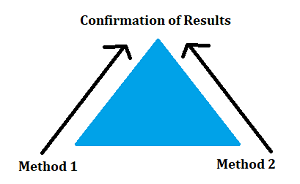 Triangulation, in statistics and the social sciences, is a research tactic that involves using two or more different ways to verify one result. It takes its name from the triangulation used in land surveys and navigation, where data from two points in space are used to determine a third.
Triangulation, in statistics and the social sciences, is a research tactic that involves using two or more different ways to verify one result. It takes its name from the triangulation used in land surveys and navigation, where data from two points in space are used to determine a third.
It allows us to see a problem in more dimensions than a one-prong research attempt would, and is also meant to eliminate biases tied to a specific research method, researcher, data source or theory.
Types of Triangulation
Triangulation is generally considered to fall into one of four different types:
- Method triangulation occurs when two or more methods are used to gather data. This may be one qualitative research method and one quantitative research method. Alternatively, it may mean that different types of either quantitative or qualitative methods are used. The key is that the methods must be different enough to make the results somewhat independent.
- Investigator triangulation happens when two or more investigators (i.e., researchers) work independently to gather the same data.
- Theory triangulation occurs when two or more alternate theories are called upon for calculations and data analysis.
- Data source triangulation is when two different, independent (but essentially identical) data sources are used. This might be in time, if the data is gathered at different points in time, or in space, if the data is gathered at different physical locations.
References
Carter, Bryant-Lukosius, DiCenso, Blythe, & Neville. The use of triangulation in qualitative research. Oncol Nurs Forum. 2014 Sep;41(5):545-7. doi: 10.1188/14.ONF.545-547. Retrieved from https://www.ncbi.nlm.nih.gov/pubmed/25158659 on June 27th, 2018.
Gentle, J. (2009). Computational Statistics.
Terrell, S. (2021). Statistics Translated, Second Edition: A Step-by-Step Guide to Analyzing and Interpreting Data Second Edition. Guildford Press.
Chapter: 8 Analysis Through Tri-angulation and Synthesis to Interpret Data in a Mixed Methods Evaluation. from Evaluation Design for Complex Global Initiatives: Workshop Summary (2014). The National Academies Press. Retrieved from https://www.nap.edu/read/18739/chapter/9 on June 27th, 2018.
PUB 695 3.0, Triangulation. Open University. Retrieved from http://www.open.edu/openlearncreate/mod/page/view.php?id=65924 on June 28, 2018.